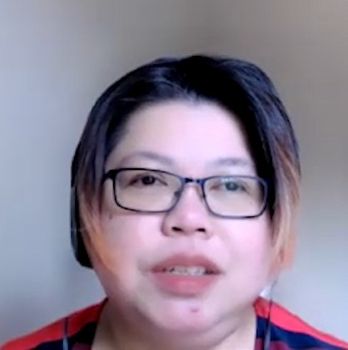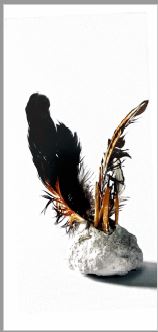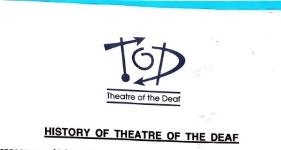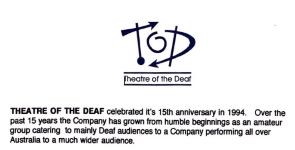Items
Search full-text
“Australia Council releases its first Disability Action Plan”
- Film Australia Limited
-
 "Interview with CB Mako" CB Mako is a non-fiction, fiction and fanfiction writer and disability advocate. Interview Summary cubbie||CB Mako is a creative practitioner and disability advocate who emphasizes the importance of accessibility in the arts, advocating for digital inclusivity and the elimination of ableist practices. cubbie pushes for systemic change so that future generations, like their disabled child, don't have to fight for access to art and literature. Success for cubbie is defined by the progress made when institutions include disability in their funding, competitions, and programming. Using the pen name CB Mako and going by pronouns cubbie/they/them, urges non-disabled artists, particularly from communities of colour, to proactively incorporate access in their work.
"Interview with CB Mako" CB Mako is a non-fiction, fiction and fanfiction writer and disability advocate. Interview Summary cubbie||CB Mako is a creative practitioner and disability advocate who emphasizes the importance of accessibility in the arts, advocating for digital inclusivity and the elimination of ableist practices. cubbie pushes for systemic change so that future generations, like their disabled child, don't have to fight for access to art and literature. Success for cubbie is defined by the progress made when institutions include disability in their funding, competitions, and programming. Using the pen name CB Mako and going by pronouns cubbie/they/them, urges non-disabled artists, particularly from communities of colour, to proactively incorporate access in their work. -
 “Arts Access Victoria Connecting to Country 2018 Invitation”
“Arts Access Victoria Connecting to Country 2018 Invitation” -
 "Australian Theatre of the Deaf - History of Theatre of the Deaf" History of Australian Theatre of the Deaf, until 1995, noting productions - “Culture Shock”, “Tunnel Vision”, “Shape UP!”, “A Day In the Life Of Angels”, “Same Difference”, “The Very First Day” – performer appearances in Australian television - “GP”, “The Money or the Gun”, “A Country Practice”
"Australian Theatre of the Deaf - History of Theatre of the Deaf" History of Australian Theatre of the Deaf, until 1995, noting productions - “Culture Shock”, “Tunnel Vision”, “Shape UP!”, “A Day In the Life Of Angels”, “Same Difference”, “The Very First Day” – performer appearances in Australian television - “GP”, “The Money or the Gun”, “A Country Practice” -
 "Australian Theatre of The Deaf - Work and Recent Achievements - 1994" Australian Theatre of The Deaf Work and Recent Achievements 1994 - Information about Australian Theatre of the Deaf, as it celebrates 15th anniversary, three current school shows (DAY IN THE LIFE OF ANGELS, THE VERY FIRST DAY, SAME DIFFERENCE), performance for general public (SAVANT at the Performance Space, and DEAF AND GAY was presented as part of Sydney Gay and Lesbian Mardi Gras), and other touring, appearances, and events, and policy since 1989 to employ only Deaf actors.
"Australian Theatre of The Deaf - Work and Recent Achievements - 1994" Australian Theatre of The Deaf Work and Recent Achievements 1994 - Information about Australian Theatre of the Deaf, as it celebrates 15th anniversary, three current school shows (DAY IN THE LIFE OF ANGELS, THE VERY FIRST DAY, SAME DIFFERENCE), performance for general public (SAVANT at the Performance Space, and DEAF AND GAY was presented as part of Sydney Gay and Lesbian Mardi Gras), and other touring, appearances, and events, and policy since 1989 to employ only Deaf actors. - Kelvin Heffernan
- James McDonald
- Daniel Pace
-
"Royal Commission on Human Relationships" In 1977, the Royal Commission on Human Relationships noted the legal and human rights of handicapped children and adults.
-
“The Australian Theatre of the Deaf established” In 1973, the Australian Theatre of the Deaf (ATOD) began as an amateur drama group. ATOD became a professional group in 1979 and staged many works during the decades to follow. Leading ATOD actors were interviewed in the 1990s for SBS about their work; snippets of a rehearsal were captured on film.
-
“Melbourne venue guides published in the 1990s” Arts Access Victoria published the ‘Melbourne Venue Guide: A Description of Access for People with Disabilities to Some of Melbourne's Major Entertainment Venues’ in 1992. They published an updated guide in 1998: ‘The Vic Venue Guide: A Guide to Access and Facilities at Over 75 Victorian Entertainment, Sporting and Cultural Venues’. This updated guide was produced in conjunction with VicHealth and supported by Arts Victoria. The guide provided information about where to make bookings, parking and public transport, facilities and access for disabled patrons, and seating.
-
“The national tour of the exhibition BodySuits results in commissions and new opportunities for artists” A visual arts exhibition, BodySuits, toured nationally between 1997 and 1999. It was curated by Jane Trengove. This resulted in commissions and new opportunities for artists. Arts Access Victoria published a catalogue for the exhibition in 1997; the exhibition showed in Melbourne from 5 July - 2 August 1997 at 200 Gertrude Street, Fitzroy (a location now known as Gertrude Contemporary).
-
“Deaf Arts Network (DAN) established in 2000” The Deaf Arts Network (DAN) was established with the aid of Arts Access Victoria in Melbourne in 2000. DAN “is dedicated to increasing the participation of deaf and hard of hearing people in the arts as artists, arts workers and audiences. […] DAN provides an authentic and unique cultural voice for the deaf community, a community historically marginalised from participation in the arts.”
-
“The documentary series ‘You Can't Ask That’ premieres in 2016” The ABC started a documentary series in 2016 called ‘You Can't Ask That,’ which asks "outrageous, uncomfortable and shocking questions to uncover the truth behind some of the most marginalised and misunderstood Australians." The series has featured episodes focused on people with short stature, Downs syndrome, schizophrenia, and autism, Deaf people, blind people, and wheelchair users.
-
“Auslan features intermittently on Australian television throughout the 1990s, 2000s, and 2010s” Auslan appeared intermittently on Australian television throughout the 1990s, 2000s, and 2010s. Ana Maria Belo has curated a video compilation of scenes featuring Auslan. Belo calls it “a very brief history lesson on Deaf Actors on Australian Television before Social Media.” As she explains, “this is not a complete list of performances, but a nod to the actors who blazed a mighty trail for those of us who attempt to follow.”
-
"Dr G. Yunupingu plays keyboards, guitar and percussion on Yothu Yindi's 'Treaty'" Geoffery Gurrumul Yunupingu, an indigenous Australian from the Gumati Clan on Echo Island, was a blind musician, singer and song writer. As a child taught himself to play a guitar "upside down". He started as a guitarist, key board player and percussionist for the pop/rock band Yothu Yindi who had the international hit "Treaty" in 1991.
- Bell Shakespeare Company
- IHOS Opera
- Microcare
- Victorian Theatre of the Deaf
- Barkly Regional Arts
-
"Bree Hadley (2022) Disability and the Arts, Creative, and Cultural Industries in Australia. Australian Academy of Humanities" Reads, in part "There are five interrelated factors that support arts workers, arts organisations, and the arts sector at large to develop improved policy, protocol, and training practices."
-
“In 2003, a demonstration outside Canberra’s Parliament House protests changes to Centrelink guidelines” In 2003, the Totally and Permanently Incapacitated Disabled Soldiers Association staged a protest outside Parliament House in Canberra, over changes to Centrelink guidelines that could have cost them up to $200 per week in income. “He said in Parliament that our payments are adequate, he's somebody who has never had the time to speak to us,” Association President John Ryan remarked of then Prime Minister John Howard.
-
"The United Nations makes comments on the rights of people with disabilities." In 1951, the United Nations made comments on the rights of people with disabilities."The focus of the United Nations on disability issues shifted in the late 1950s from a welfare perspective to one of social welfare."
-
“Lesley Hall leads a protest of the Miss Victoria Quest beauty contest” In 1981, Lesley Hall and a group of disability activists protested at the Miss Victoria Beauty Quest (a beauty pagent that was a fundraiser for the Spastic Society in Victoria). The focus on physical perfections was seen “as the norm all must attain if they are to be fully accepted into society”. The protests raised much media attention and marked the beginning of a shift in thinking about the place in Australian society of people with disabilities.
